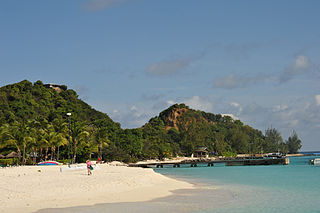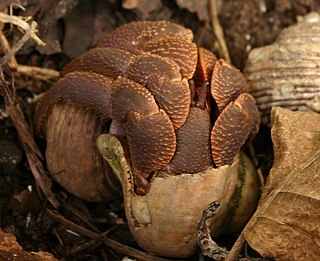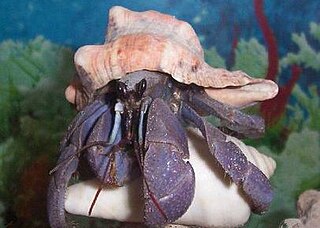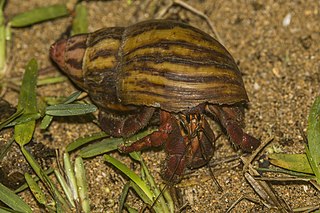
Hermit crabs are anomuran decapod crustaceans of the superfamily Paguroidea that have adapted to occupy empty scavenged mollusc shells to protect their fragile exoskeletons. There are over 800 species of hermit crab, most of which possess an asymmetric abdomen concealed by a snug-fitting shell. Hermit crabs' soft (non-calcified) abdominal exoskeleton means they must occupy shelter produced by other organisms or risk being defenseless.

The Caribbean hermit crab, also known as the soldier crab, West Atlantic crab, tree crab, or purple pincher, is a species of land hermit crab native to the west Atlantic, Belize, southern Florida, Venezuela, and the West Indies.

The Ecuadorian hermit crab also known as the Pacific hermit crab is a species of land hermit crab. It is one of the two land hermit crabs commonly sold in North America as pets, the other being the Caribbean hermit crab.

The Australian land hermit crab is a terrestrial hermit crab species, native to Australia. It is a nocturnal, omnivorous crustacean. They are gregarious and thrive in tropical areas near water.

The Coenobitidae are the family of terrestrial hermit crabs, widely known for their land-living habits as adults. They are found in coastal tropical regions around the world and require access to the ocean to breed.

The genus Coenobita contains 17 species of terrestrial hermit crabs. Several species in this genus are kept as pets.

The halloween hermit crab, also known as the striped hermit crab or orange-legged hermit crab, is a brightly colored aquatic hermit crab of the family Diogenidae. Besides its ability to routinely clean algae in aquaria, the halloween hermit crab's festive striped coloration also appeals to enthusiasts; it is considered the most brightly colored hermit crab in normal aquarium use.

Palm Island in the Grenadines is a small island one mile from Union Island, only accessible by boat. It has an area of 135 acres (0.55 km2) and has five beaches.

Coenobita perlatus is a species of terrestrial hermit crab. It is known as the strawberry hermit crab because of its reddish-orange colours. It is a widespread scavenger across the Indo-Pacific, and wild-caught specimens are traded to hobby aquarists.

Coenobita cavipes is a species of land hermit crab native to the eastern parts of Africa, the Indonesia, Philippines, China, Japan, Malaysia, Taiwan, Polynesia, and Micronesia. While these hermit crabs are terrestrial, they prefer to reside near the shores for access of both water and land.

Coenobita rugosus is a species of land hermit crab native to Indonesia, Australia and the east African coast to the south west Pacific.

Coenobita brevimanus is a species of terrestrial hermit crab belonging to the family Coenobitidae, which is composed of coastal living terrestrial hermit crabs. From there it belongs to the genus Coenobita, one of two genera split from the family, which contains sixteen species. The Latin origins of the species name, brevimanus, come from the adjective brevis ("small") and the noun manus ("hands"). It is known as the Indos crab or Indonesian crab because it is primarily distributed throughout the Indo-Pacific.

Coenobita violascens is a species of land hermit crab from family Coenobitidae. It is native to the Indonesia, Nicobar Islands, Thailand, Cambodia, Philippines, and Tanzania.

The coconut crab is a terrestrial species of giant hermit crab, and is also known as the robber crab or palm thief. It is the largest terrestrial arthropod known, with a weight of up to 4.1 kg (9 lb). The distance from the tip of one leg to the tip of another can be as wide as 1 m. It is found on islands across the Indian and Pacific Oceans, as far east as the Gambier Islands, Pitcairn Islands and Caroline Island and as far west as Zanzibar. While its range broadly shadows the distribution of the coconut palm, the coconut crab has been extirpated from most areas with a significant human population such as mainland Australia and Madagascar.

Coenobita scaevola is a species of terrestrial hermit crab from the western Indian Ocean and Red Sea.

Coenobita spinosus is one of the sixteen species of terrestrial hermit crabs.
Coenobita lila is a species of land hermit crab in the genus Coenobita. Coenobita lila is described from Singapore, Malaysia and Indonesia.

Coenobita rubescens is a species of terrestrial (land-living) hermit crab, family Coenobitidae.
Coenobita pseudorugosus is a species of terrestrial hermit crab, family Coenobitidae.
















